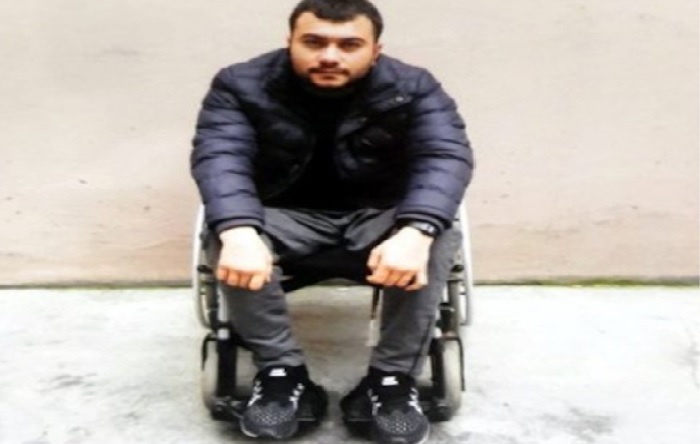A severely disabled inmate is being kept in a solitary cell despite a medical report saying he is not able to take care of himself and is not fit to stay alone, Turkish media reported.
Serdal Yıldırım, 29, who is disabled as a result of a car accident, is currently being held at Istanbul’s Metris Prison although his family appealed to the Bakırköy 1st High Criminal Court for the postponement of his sentence. The appeal was rejected, saying Yildirim poses a “threat to society.”
Speaking to the Duvar website, Fatma Izdirap, Yıldırım’s mother, said she was pained and worried that her son has to stay alone in his cell. “My son’s health is not good, his illness has progressed considerably and he also has developed an infection,” she said. “He needs surgery, but that’s also not possible under these conditions.”
According to Mehmet Acettin from the Human Rights Association (IHD), Yıldırım had the opportunity to regain his ability to walk if he had received physical therapy two times a week, but this wasn’t done in prison and his health worsened.
Izdirap said her son’s mental health was also deteriorating. “During our telephone calls he keeps telling me it does not matter if he dies,” she said.
Adding that she was the sole caretaker for her son when he was at home, she demanded to know who was taking care of him now.
Yıldırım was arrested in 2015 and sentenced to nine years in prison on May 31, 2016 for affiliation with a terrorist organization. The charges were based on accusations made by a family that had an ongoing feud with Yıldırım’s family, according to Acettin.
“Even the police who came to arrest him were dumbfounded when they saw his condition,” Acettin said. “He could barely move his body, let alone work for a terrorist organization.”
Human rights activists and Yıldırım ‘s family were also outraged that although he was initially sent to prison in his hometown of Mardin, a southeastern Turkish province, he was later transferred hundreds of kilometers away to Istanbul.
Gülistan Kılıç Koçyiğit from the Peoples’ Democratic Party (HDP) submitted a written parliamentary question to the justice ministry asking why the forensic report was not taken into consideration and how Yıldırım could be a threat to society in his current state. She also asked if there was a care system for inmates in Yildirim’s condition.
Human rights activists and opposition politicians have frequently criticized authorities for not releasing critically ill prisoners, so they can seek proper treatment. Human rights defender and HDP deputy Ömer Faruk Gergerlioğlu said ill prisoners were not released until they were at a point of no return.
According to Gergerlioğlu, sick prisoners are released when the authorities realize they will die soon. He claimed that prisoners did not have access to proper healthcare facilities such as hospitals or infirmaries.
According to the most recent statistics published by the Human Rights Association (İHD), the number of sick prisoners is in the thousands, more than 600 of whom are critically ill. Although most of the seriously ill patients have forensic and medical reports deeming them unfit to remain in prison, they are not released. Authorities refuse to free them on the grounds that they pose a potential danger to society.
A number of critically ill prisoners passed away in 2020 because they were not released in time to receive proper medical treatment.
Source: Stockholm Center for Freedom (SCF)



